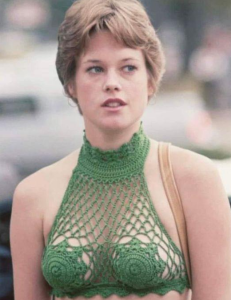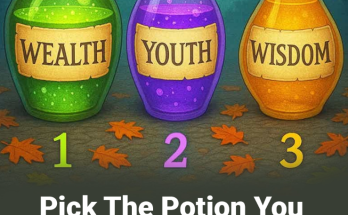From the very first moment she opened her eyes, it was clear that she was not like other children. The nurses at the small-town hospital still remembered the way she came into the world—kicking, screaming, and somehow wide awake, as though determined to announce her presence to everyone within earshot. Her mother used to laugh and say, “She didn’t cry like a baby—she roared like she had something to prove.” And maybe she did. Because from the day she was born, she seemed destined to live a wild, untamable life.
Her name was Lily Monroe, and even as a child, she had the kind of spirit that made adults shake their heads in both admiration and exhaustion. While other kids played quietly in the yard, Lily was climbing trees, running barefoot through the woods, or chasing thunderstorms just to feel the rain sting her skin. She collected frogs, befriended stray dogs, and swore she could talk to the crows that perched on the old fence near her family’s farm. Her mother used to call her “the storm in a sundress.” Her father simply smiled and said, “She’s got her own compass, and it doesn’t point north like the rest of us.”
By the time she was ten, Lily had already broken her arm twice—once from trying to ride her bicycle down a steep hill and another time after jumping off the barn roof with an umbrella, convinced she could float like Mary Poppins. But every time she got hurt, she’d dust herself off, grin through the pain, and say, “Guess I’ll just try again.” There was no fear in her—just endless curiosity and a hunger for something bigger than the world she was born into.
When she hit her teenage years, that wildness only grew. While her classmates obsessed over makeup and movies, Lily spent her weekends riding her old dirt bike through the backroads or sneaking out at midnight to watch the stars. She hated being told what to do, and she hated the idea of limits even more. Teachers said she was “bright but restless,” always daydreaming out the window about a life beyond the walls of the classroom. She wanted to see everything, touch everything, feel everything. The world, to her, wasn’t a place to study—it was a place to live in, deeply and unapologetically.
At sixteen, she saved up money from odd jobs and bought her first guitar from a pawn shop. It was battered, missing a string, and smelled faintly of smoke—but to Lily, it was freedom. She taught herself to play by ear, sitting on the porch at dusk, her voice rising with the crickets and cicadas. Before long, she was writing songs about small towns, heartbreak, and the roads that never seemed to end. Her music carried that same wild spirit she had since birth—untamed, honest, and a little reckless.
After high school, while most of her friends packed for college, Lily packed a duffel bag, slung her guitar over her shoulder, and hit the road. She didn’t have a plan—just a map with too many circles on it and a promise to herself that she’d never settle before she saw the ocean, the mountains, and the desert. She hitchhiked, camped, and played music in roadside bars for gas money. Sometimes she slept in the back of a pickup truck, sometimes on a stranger’s couch, but she never complained. Every sunrise was a new beginning, every highway a story waiting to happen.
People remembered her everywhere she went. In Nashville, she played on a corner until a bar owner invited her inside to sing for the crowd. In New Mexico, she joined a group of artists who lived out of vans and painted murals on desert walls. In Colorado, she spent a summer tending horses at a ranch, her skin sunburned and her heart free. Lily had a way of making people feel alive just by being near her. Her laughter was contagious, her courage magnetic.
Yet even wild hearts feel the ache of loneliness. There were nights when she’d sit by a campfire, staring at the flames, wondering what it meant to belong. She missed her mother’s cooking, her father’s quiet wisdom, the sound of rain hitting the tin roof of home. But the road always called her back. “Maybe someday,” she’d whisper to herself, “but not yet. There’s still more to see.”
Years passed, and Lily became a woman with stories etched into her skin—tiny scars from adventures, tattoos that marked places she’d loved, and eyes that seemed to hold both lightning and peace. She had lived a dozen lifetimes in one. She’d fallen in love and walked away when it turned to chains. She’d stood on cliffs where the ocean crashed below and screamed into the wind just to feel small. She’d danced barefoot at music festivals, sung under bridges, and held strangers who cried to her songs.
When her mother fell ill, Lily returned home for the first time in nearly a decade. The town hadn’t changed much—the same dusty roads, the same corner store, the same faces. But Lily had changed. She was softer now, wiser, her wildness tempered not by defeat, but by understanding. She sat by her mother’s bedside, playing the same guitar she’d carried all those years. The music filled the room like sunlight, and her mother smiled, saying, “I always knew you’d find your way.”
After her mother’s passing, Lily stayed longer than she’d planned. She fixed up the old farmhouse, painted the porch, and planted wildflowers by the fence. For the first time, she felt peace—not the restless kind that came from running, but the kind that comes from knowing you’ve lived fully. She still played music, still took long rides on her motorcycle, but she also learned to sit still, to watch the sun set without thinking about the next horizon.
People in town said she finally “settled down,” but those who really knew her understood the truth—Lily hadn’t settled. She had simply found a new kind of wildness, one that lived quietly in her soul. The storms she used to chase were now within her songs, and the roads she used to wander existed in her memories.
On warm summer evenings, you could still hear her laughter echoing across the fields. She’d sit on that porch, guitar in hand, hair wild as ever, singing to the fireflies. And anyone who passed by could feel it—that unbreakable spirit, that spark that refused to fade.
Because from the day she was born, Lily Monroe was never meant to live an ordinary life. She was meant to live all of it—the pain, the joy, the chaos, the beauty. She was born to run, to love fiercely, and to leave behind a trail of stories that no one would ever forget.


